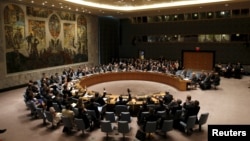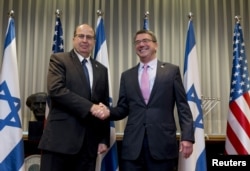The U.N. Security Council unanimously approved the Iran nuclear deal Monday, clearing a path to lift crippling economic sanctions against Tehran while restraining it its nuclear development program.
Monday's vote was largely a formality, because all of the Council's five permanent members — the United States, Britain, France, Russia and China — along with Germany, negotiated the deal with Iran. The Council ordered its nuclear watchdog, the International Atomic Energy Agency, to "undertake the necessary verification and monitoring of Iran's nuclear commitments,' and it called on Iran to "cooperate fully" with the IAEA officials.
Assuming Iran adheres to the nuclear agreement, the approved U.N. resolution calls for an eventual end to seven sets of sanctions passed since 2006 to force Iran to halt what the United Nations and the West contended was an effort to develop a nuclear weapon. Tehran has always said its nuclear program was for peaceful purposes.
The sanctions will be dropped when the U.N. inspectors confirm that Iran's nuclear program is being conducted peacefully.
U.S. Ambassador to the U.N., Samantha Powers, praised the Council for "testing diplomacy," while adding that the deal does not diminish continuing American concerns about Iran. She said those concerns include human rights violations, Iran's support for terrorism and its ballistic missiles program.
Israel’s Ambassador to the U.N. Ron Prosor called the resolution a “tragedy.”
“Iran will now have $150 billion to fund terrorist groups. How much money will go to Hezbollah and Hamas? How much money will go to [Syrian President Bashar al-Assad]?" he said. "How much money will go to fund worldwide terror activities?”
German pact
Germany on Monday became the first of the countries that negotiated the pact with Iran to take steps to renew trade with Tehran. Berlin's economic minister, Sigmar Gabriel, visited the Iranian capital, but warned Tehran that Israel's security is of "significant importance" to Germany. Iran does not recognize the Jewish state and has vowed its destruction.
"With the recent nuclear agreement and the future events, new issues will be raised for Iran and we have developed the bases, both inside and outside the country, to produce security in the Middle East, and I believe it is for the benefit of Iran as well," Gabriel said. "Developing security in the region and securing Israel is of significant importance to us."
With the U.N. resolution approved, the Iranian accord could take effect within 90 days. The next key milestone would come after the IAEA issues a report, expected in December, on the resolution of past and present issues with Iran's nuclear program. That is when Iran would see relief from the sanctions that have hurt its economy.
The U.N. vote comes as U.S. lawmakers begin their own review of the agreement, which President Barack Obama's administration sent to Congress on Sunday, setting off a 60-day review period. Lawmakers can choose to approve the deal or reject it and refuse to lift congressionally imposed sanctions against Iran. Obama has said he would veto any rejection, which would then force both the Senate and House to produce a two-thirds majority to override the veto.
White House spokesman Josh Earnest told reporters on Monday that there will be separate classified briefings on Wednesday for House and Senate members, and an open hearing Thursday before the Senate Foreign Relations Committee.
Republican Senate Majority Leader Mitch McConnell has predicted President Obama will have a “real challenge” getting the pact through a skeptical, Republican-led Congress. McConnell has criticized it as “the best deal acceptable to Iran, rather than one that might actually end Iran’s nuclear program."
Selling the deal
U.S. Defense Secretary Ash Carter is on a tour of the Middle East as part of efforts to ease fears about the nuclear deal. Carter began the trip in Israel Sunday and will travel to Saudi Arabia, Iran's main regional rival, as well as Jordan.
On Tuesday Carter will meet with Israeli Prime Minister Benjamin Netanyahu who has called the deal a "historic mistake" that would only make it easier for Iran to back its proxies in the Middle East.
Saudi Arabia has officially said it supports the deal, although it is also thought to have similar concerns to Israel's that the agreement will enhance the Shi'ite power’s influence across the Middle East.
“One of the reasons this deal is a good one is that it does nothing to prevent the military option ... which we are preserving and continually improving,” Carter told reporters en route to Tel Aviv. “But the point of the nuclear deal is to get the result of no Iranian nuclear weapon without carrying out a military strike.”
He said he does not expect to change Israeli officials’ minds about the deal, but said the two countries could “agree to disagree.”
Kerry's defense
U.S. Secretary of State John Kerry addressed reporters on Monday, following a series of high-profile television appearances over the weekend, in which he said the deal likely won't restart U.S. diplomatic relations with Tehran, and that he is not planning to visit Tehran.
"I look forward to continuing over the next 60 days to having discussions and testimony and private meetings and whatever form is necessary to help convince the Congress that this deal does exactly what it says it does," he said on Monday. "[The deal] prevents the possibility of a nuclear weapon from falling into the hands of another country while simultaneously opening up the opportunity for the United States to, at this moment in time, put to test the verification measures and all of those things that Iran has agreed to, rather than choosing today to force the potential of a conflict almost immediately, which is exactly what would happen if the Congress does not accept this agreement."
Kerry made the statement during a news conference with Cuban Foreign Minister Bruno Rodríguez Parrilla at the State Department.
Iranian reaction
On Saturday, Iran's Supreme Leader Ayatollah Khamenei commented the deal does not signal cooperation with the United States and its allies on other issues, triggering a stern response from Israeli Prime Minister Netanyahu.
"If anyone thought that the sweeping concessions for Iran would bring about a change in its policy, they have received a decisive answer over the weekend...," Netanyahu said Sunday during a weekly Cabinet meeting. "The Iranians don't even make an effort to hide the fact that they will use the hundreds of billions of dollars they will receive in this deal to arm their terror machine."
In an interview that aired Sunday, British Prime Minister David Cameron said he isn't idealistic about what the deal means for diplomatic relations with Iran.
"We shouldn't be naive or starry-eyed in any way about the regime that we are dealing with. I am certainly not," he told NBC's Meet the Press. "I spoke to [Iranian] President Rouhani yesterday and said we want to see a change in approach that Iran takes to issues like Syria and Yemen and to terrorism in the region, and we want the change in behavior that should follow from that change. So we are not starry-eyed at all and I would reassure our Gulf allies about that, but actually taking the nuclear weapon issue off the table, that is a success."
Paul Wachtel, an economics professor at New York University, told VOA that long-standing U.S. sanctions and the more recent U.N. restrictions "severely hampered" Tehran's economy, pushing it into a "deep recession." He said Iran's economy could recover within two or three years of the lifting of the sanctions. But Wachtel said questions remain about what Tehran might do with its windfall of cash, as frozen bank accounts are unlocked at the same time the country boosts its oil exports.
"It is enough money to make a lot of trouble" in the Mideast through support of insurgencies Iran favors, Wachtel said. "As the sanctions are moved, to what extent is it interested in trading with the rest of the world? Which they do, I have no idea."
Some information is from AP and AFP.






